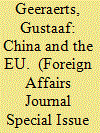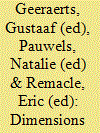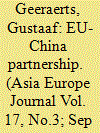|
|
|
Sort Order |
|
|
|
Items / Page
|
|
|
|
|
|
|
| Srl | Item |
| 1 |
ID:
094676


|
|
|
| 2 |
ID:
073897


|
|
|
|
|
| Publication |
Brussels, Peter Lang, 2006.
|
| Description |
283p.
|
| Standard Number |
9052012326
|
|
|
|
|
|
|
|
|
|
|
|
Copies: C:1/I:0,R:0,Q:0
Circulation
| Accession# | Call# | Current Location | Status | Policy | Location |
| 051648 | 327.172/GEE 051648 | Main | On Shelf | General | |
|
|
|
|
| 3 |
ID:
167807


|
|
|
|
|
| Summary/Abstract |
The EU-China relationship is driven by two distinct underlying logics: a power-based one and a transformational one. The power-based logic is premised on a belief that because of anarchy, power politics and conflicts of interest cannot be entirely overcome. According to this view, intercourse between the EU and China will reflect their relative power positions and display concerns about relative gains, making cooperation between them more difficult. In contrast, a transformational logic reflects a more liberal/constructivist perspective. It suggests that rules and shared norms can sharply reduce conflicts of interest and mitigate concerns about relative gains through the creation of trust and reciprocal socialization, making enduring cooperation between the EU and China more likely. The EU-China relationship is thus clearly mixed, consisting of an array of cooperative and competitive elements. At any given moment, the relationship can be pictured as residing somewhere along a spectrum that extends from pure cooperation at one extreme to unrestrained competition at the other. Diverging trends, which are mutually reinforcing, are pushing the relationship toward competition, converging trends—also reinforcing each other—are promoting cooperation. The direction in which the EU-China partnership can possibly evolve—more competition or more cooperation—will be moulded by the relative strength of diverging and converging trends.
|
|
|
|
|
|
|
|
|
|
|
|
|
|
|
|
| 4 |
ID:
106045


|
|
|
|
|
| Publication |
2011.
|
| Summary/Abstract |
The issue of human rights has been one of the most sensitive elements in the EU-China relationship. It is difficult to deal with in the official relationship between the EU and the Chinese government, and has caused controversy in public opinion and in the media. The question of human rights often appears as the aspect of the relationship between Europe and China that constitutes the greatest and most destabilizing of differences between them. We have seen instances of this with regards to specific issues such as Tibet, notably when President Sarkozy, as holder of the EU Presidency, met the Dalai Lama in 2008, and a generalized criticism in Europe that year of China's human rights which surrounded the Beijing Olympics, notably during the Olympic torch procession, and when many human rights activists advocated a boycott of the opening ceremony by European leaders. The awarding of the Nobel Peace Prize to Liu Xiaobo in 2010 brought human rights to the fore once again.
|
|
|
|
|
|
|
|
|
|
|
|
|
|
|
|
| 5 |
ID:
138090


|
|
|
|
|
| Summary/Abstract |
This study presents the strategic hedging framework as a way to trace the determinants of the foreign policies of hedging states. We use the case of Chinese energy security strategy in the Middle East as an illustrative case study. It first uses four criteria to establish that China’s energy security strategy in the Middle East is a strong example of strategic hedging behaviour. Then it examines the impact of oil production in the Middle East countries on the growth of Chinese economic relationships with these countries. The results of this study show clearly that oil production plays an important role in the Sino-Middle East relations. We find a positive relationship between oil production in Middle East countries, on the one hand, and the distribution and growth of China’s trade and investment with these countries, on the other hand. These results confirm that strategic hedging behaviour leads to developing China’s economic relations with the oil-producing countries in order to cover its growing needs for energy to support its economic growth. This article represents the first attempt to trace the impact of strategic hedging behaviour on the foreign policies of hedging states. Thus, it contributes to the support of the strategic hedging framework as a new theory in international relations.
|
|
|
|
|
|
|
|
|
|
|
|
|
|
|
|
|
|
|
|
|